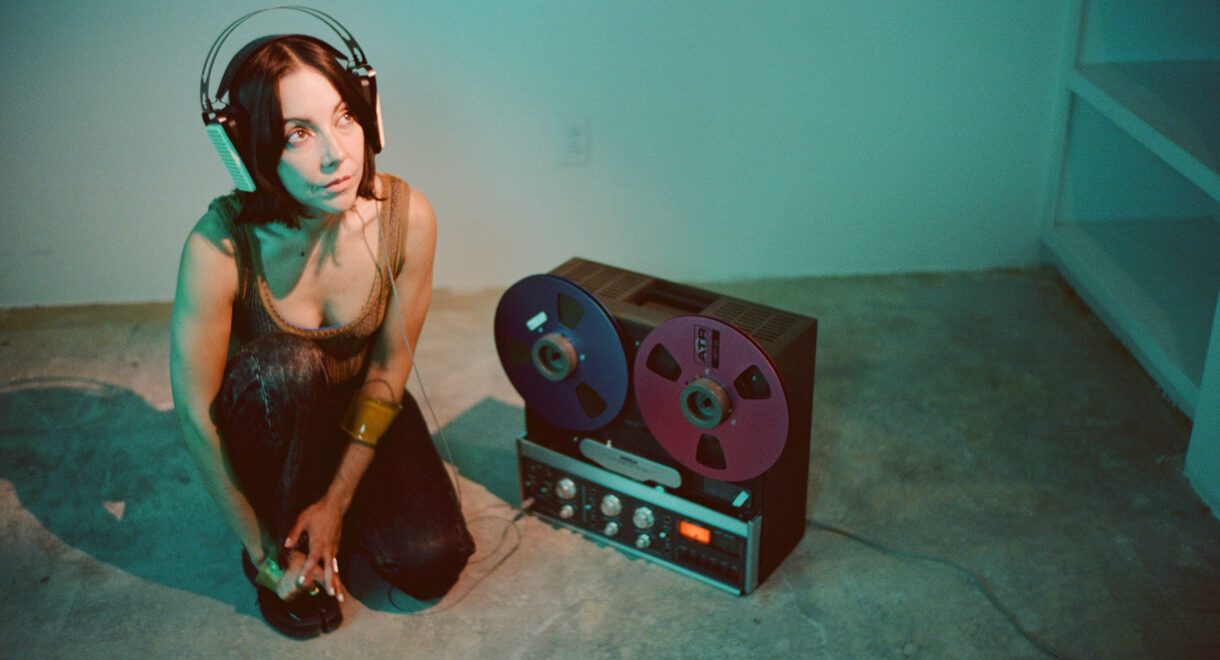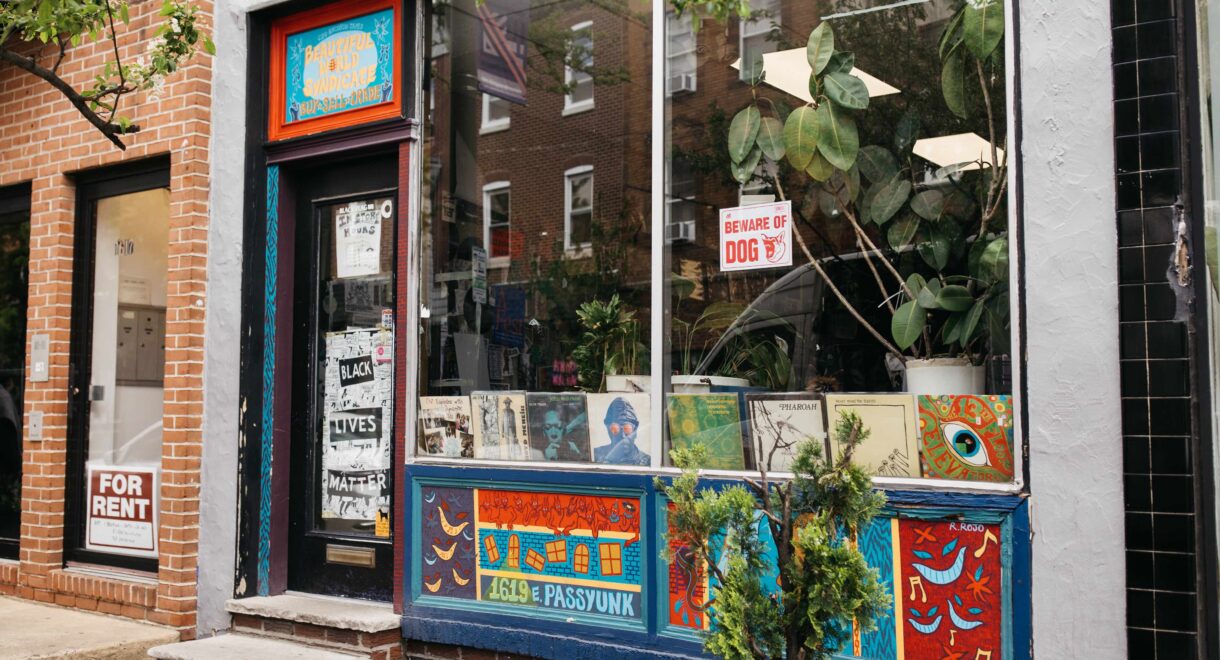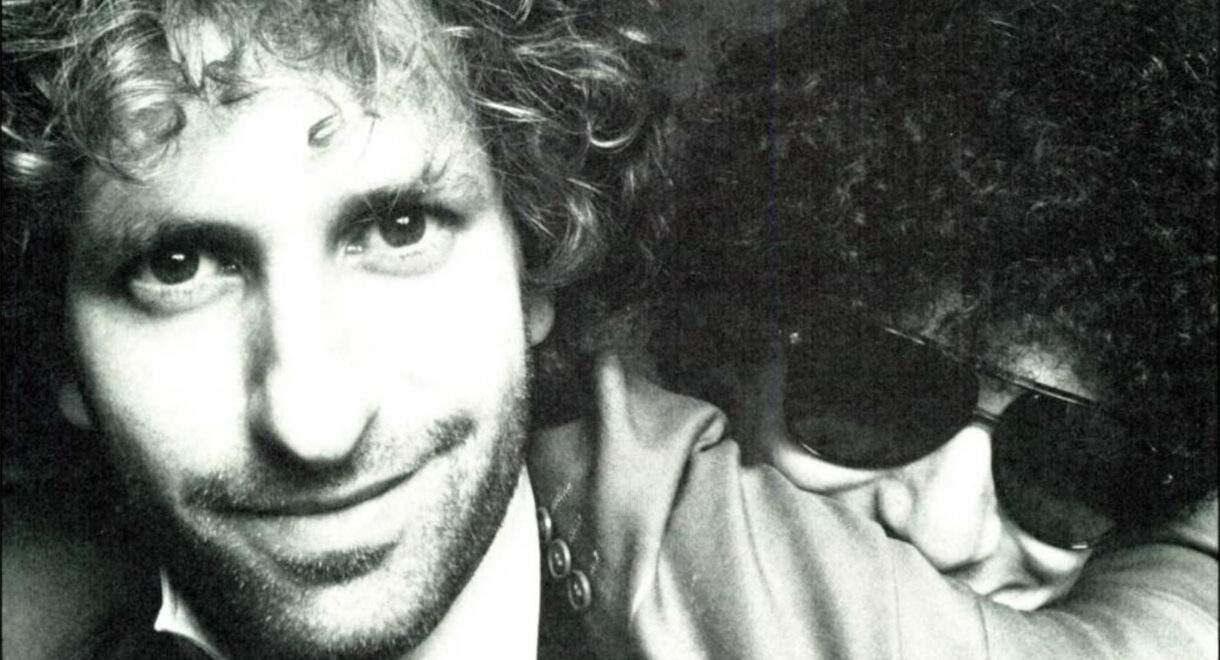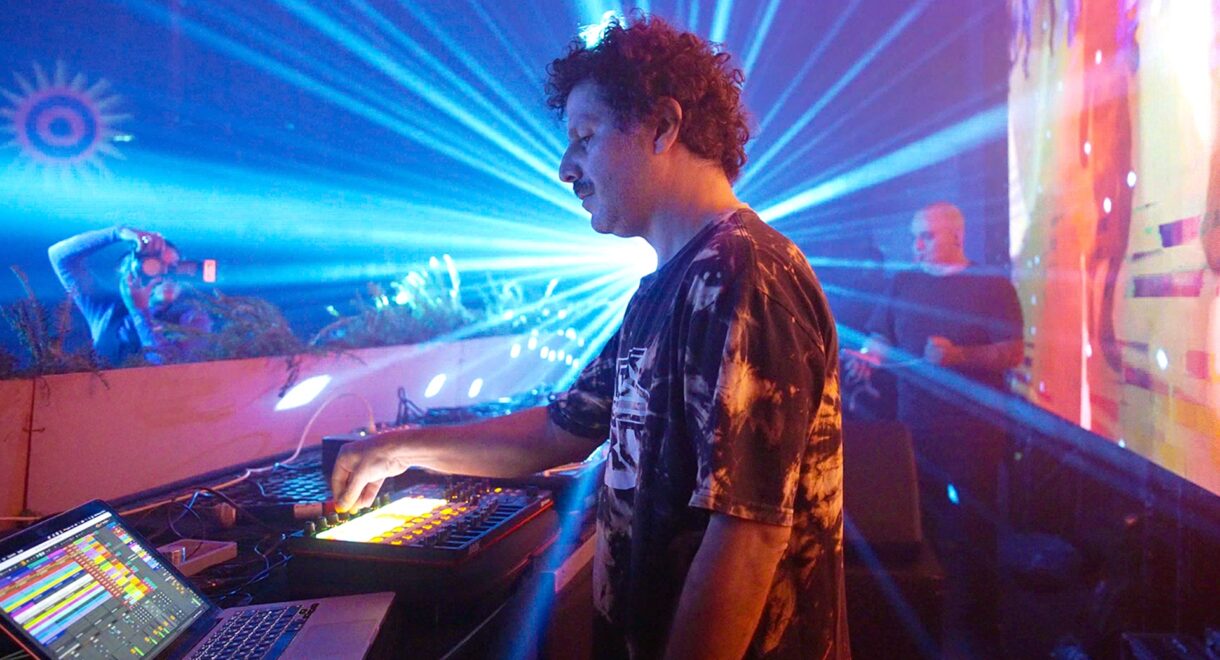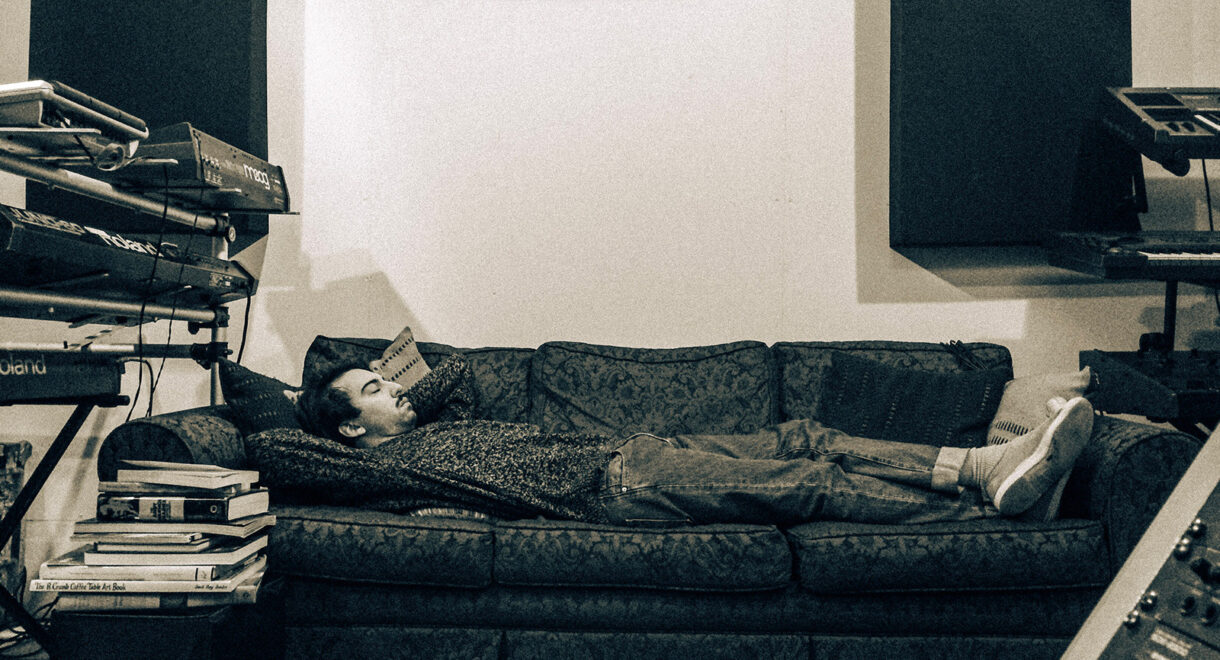Lucrecia Dalt performs live in Los Angeles on March 20th at 2220 Arts + Archives. One of our favorite albums of last year, Lucrecia Dalt’s A Danger to […]
Record Stores We Love: Discodelic Discos Viajantes (San Francisco)

A world of Latin and Caribbean dance music at Mission District staple Discodelic Discos Viajantes.
There are certain record shops that you visit because you know they’ll have what you’re looking for. Others, you go to in search of sounds that you never knew you needed. Discodelic, located in the Mission District of San Francisco, is one of those special shops that feels like you’re getting a bit of a music lesson each time you dig through their impeccably curated bins. The shop specializes in music from Latin America and the Caribbeans with stacks upon stacks of 45’s organized by decade and country from Mexico to Jamaica to Nicaragua and beyond. With two listening stations and friendly, attentive staff behind the counter, you’re sure to discover something that you’ve never heard before, and more than likely very few others have as well.
Discodelic: Discos Viajantes de Otros Dimensiones, meaning “traveling vinyl discs from other dimensions,” is operated by Ruben “Ruffy” Rangel, Maria Jose “Majoo” Salguero, and Miles Ake. Launched in 2015, the shop moved around Latin America for 10 years before finding a home in the Mission District, a historic hub for the Chicano and Latino community in San Francisco. Prior to Discodelic opening in 2024, there hadn’t been a Latin record store in the Mission for over a decade. Since then, the shop has become a vibrant and much-needed community space for Latin music lovers, DJ’s, and locals. Beyond the shop itself, the Discodelic crew also run their own reissue label, an amazing in-store mix series, 3-day festival Latinos Con Soul, and pop-up at record fairs around the world.
While Ruffy and Majoo were away digging for records across South America, In Sheep’s Clothing’s Phil Cho spoke with Miles Ake to learn more about the history of the shop, their selection, the Mission District, label curation, and more!
Hi Miles! To get started, how did Discodelic first begin? I understand that at one time the shop moved from place to place and was sort of a nomadic project?
Ruffy and Majoo started Discodelic over 10 years ago in El Salvador. It was less of a store, although it did function as a store, and more like an outpost to get records and collections. It was a central place where people could take their record collections. It was open for a couple of years in El Salvador, then they packed up and moved to Guatemala City. That was open for around one or two years with a similar concept, and then around 2017, they opened up a shop in Mexico City. That is around the time that I met Ruffy and Majoo. In 2021 we started going on digging trips together. In July 2023, we made the decision to open up a store on 24th Street in San Francisco.
For those unfamiliar with the store, how would you describe the selection?
The music we carry in the store is music to dance to. We do have soulful music that’s more mellow, but a lot of it is dance music. It’s music that we really like. There’s definitely a lot of stuff that you won’t see in other stores because either we just discovered it, or we were the only ones crazy enough to listen to the record and find a particular track that could work in someone’s DJ set. There are so many records in the shop right now. It ranges from stuff that is pretty affordable and great to rare stuff, and everything in between. The focus is definitely more on Afro-Latin music: salsa, cumbia, plena, bomba, merengue, latin soul and funk, mambo, boogaloo, etc. We have a whole Jamaican section as well, and all the different Caribbean islands as well. So it’s a large variety for people to choose from.
“There’s definitely a lot of stuff that you won’t see in other stores because we were the only ones crazy enough to listen to the record and find a particular track that could work in someone’s DJ set.”
I’ve read somewhere that Discodelic has maybe the largest collection of Afro-Latin music in the world?
Yeah, I would say that’s probably true. If not the biggest, then one of the biggest ones as far as Afro-Latin music goes. It’s really the impetus of Discodelic. What we try to do is discover and rescue music that was produced by very small groups and very small labels in the ’60s and ’70s throughout Latin America and the Caribbean, and archive it. With the label, we find the musicians and reissue the music to give the group, or at least the remaining members, a second chance for people to hear their music.
Ruffy has said in interviews that his special skill is being able to uncover the secret places where records are. Can you talk about Discodelic’s approach to digging?
The places that we go, there aren’t really record shops, or maybe there were at one point, but they no longer exist. But chances are the records are still somewhere. It’s a lot of asking around. We usually try to find old radio stations that are not necessarily still functioning, but might have records or an owner who has records. We also go to houses of people who were buying music at that time, and still held onto their records. I think the places that we go to look for music, they cherish or appreciate the past a little more than here in the United States. They hold onto things a little longer. Maybe technology is not as up to date or as fast moving. It’s definitely case to case. You have to read the situation, the person, and ask a lot of questions. You want to be trustworthy, have integrity, and make a deal that works for us and works for them too.
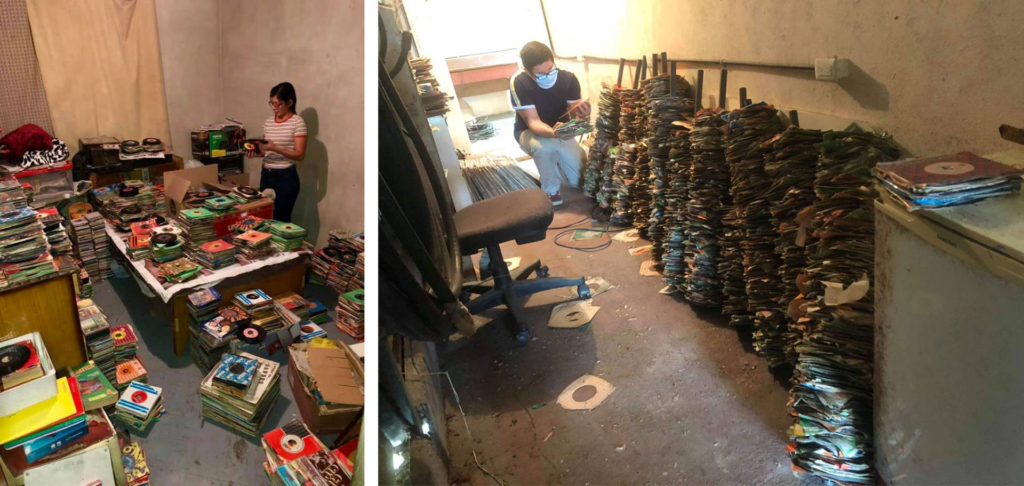
When I first visited Discodelic a few years back, I was amazed by the incredible selection of 7-inch records, and the specific breakdowns by genre, decade, and location. Can you talk about the 7-inch format and why it’s so important in Latin vinyl culture?
Typically, 45s were sent to radio stations to be played on the radio. They were not necessarily for regular people. A lot of times, the labels would send popular songs, but they’d also send stuff they were trying out as well. That’s where you can find the more obscure stuff and under-the-radar stuff. 45s also potentially had music that was not placed on the LP, or the group wasn’t even big enough to have an LP. You know what I mean? 45s were very economical for small groups to record music. Of course, there are big labels that press 45s, but there’s an immense amount of small private labels that maybe only pressed a few hundred 45s, and they would just give them out to their friends, or something like that. That’s where you can find that stuff. 45s are also geared more towards the people DJs and collectors than regular people that would just buy records to listen to at home. Usually, if somebody has a lot of 45s at their house, that means they were either a DJ for parties or they were a radio DJ. Those are the people who would have a lot of 45s that were sent to them directly by labels and bands.
Discodelic moved from Mexico City to San Francisco in 2023. What was the reason for the move?
Well, I’m born and raised here in San Francisco. I started working with Ruffy and Majoo in early 2021. At that point, we were doing digging trips. Then we were doing a lot of pop-ups around the United States, and they were really successful. We wanted to open up a shop in the United States because at the time, it was easier to operate a record store out of the States if you’re doing a lot of shipping. Shipping to the United States from Mexico is complicated because the postal service there is unpredictable. Now everything is more complicated with the tariffs… We weren’t originally going to open a storefront, but we saw how much people appreciated us being in their cities. So we thought, “Let’s create a scene like that, but have it for people that are in the city that we live in, San Francisco.” I suggested opening up in the Mission because there’s a big Latino, Central American, and Mexican population in that area. 24th Street, in particular, is a very iconic street for the Latin rock sound and the explosion of Santana. They used to play on the street out there. So it just fell into place like that, and it’s been going great. Next, we would maybe like to open another store in a city outside of California.
I read that the last Latino record shop in the Mission closed over a decade ago. What has been the local community response to the store?
People were stoked, especially the younger people that grew up in the neighborhood, and also the older people that used to go to those record stores. There was one that was up the street from where Discodelic is now called Discolandia. The sign is still there, you can’t miss it. It’s a taqueria now. These record stores were like staples of the neighborhood where you would go and buy your music. You’d also buy your concert tickets, your CDs, and musical instrument gear and stuff at these stores. They were very important cultural places. There was another store called Musica Latina on 26th and Mission. People were really excited to walk into Discodelic and be transported back to that time, seeing records they used to have, they still have, or that their parents had. It was a real trip for the older people who didn’t understand that people still had an interest in records. They’re like, “People still buy records?”
“I think the places that we go to look for music, they cherish or appreciate the past a little more than here in the United States. They hold onto things a little longer.”
In March of this year, we actually got a call from the owner of Musica Latina, Ernesto Gonzalez. He’s 80 years old now and wanted to sell his entire backstock of everything from that store. We bought it all, and did an event with him earlier this year. He was totally blown away and happy that the records continue on into other hands instead of just ending up in a Goodwill, or even worse, in a dump.
Discodelic also organizes community gatherings including in-store DJ sessions, artist Q&As, and also a four-day music festival Latinos Con Soul featuring events across San Francisco. How has it been developing the community here over the past few years?
Whether we’re having an event or not, Discodelic is definitely a place that people gather to meet up, bring friends that are visiting from out of town, or stop by before a DJ night. We were definitely doing a lot more events last year. We had Frente Cumbiero play here one night. We had an in-store event with Cut Chemist, and tons of other DJ events. For me, it’s not necessarily how much stuff we do, but more that Discodelic is a place that’s open every day, and available for anyone to come in and learn about music. We’re really grateful to even be open in a city that’s crazy expensive. The most important thing to me is to be a place where people can learn about new music. Maybe they thought they knew a lot about something, and then they came to the store and learned more. So it’s really educational in a way, and we’re promoting that culture through music.
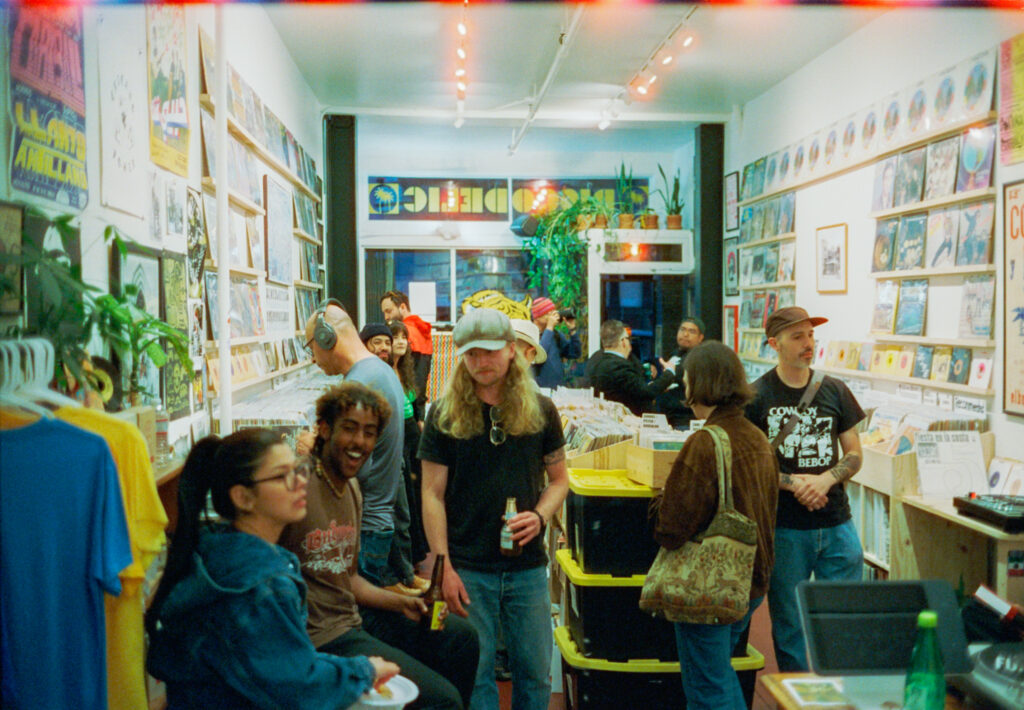
It seems like Latin music is more popular than ever around the world. Have you felt that more people beyond the Latin community in SF have been discovering and getting into Latin music?
Yeah, definitely. For example, yesterday this guy came in. He was a white guy visiting from Europe. I think he was from the Netherlands. He said he just started listening to music from Suriname, which is a former Dutch colony at the top of South America. It’s very unusual to hear somebody ask for that, but we do have a lot of Surinamese music so I was like, “Yeah there’s tons of it here. Just take some and listen to it.” He was so excited to learn and listen to new stuff. I think for people who don’t speak Spanish, it can be a little daunting to look at a record and not be able to read or understand it. But when you play the music, it perks people’s ears up. Then you can be like, “Oh this is from this country, and it’s this type of music.” I definitely turn people on to music that way too. I’ll just have a stack of records and play stuff I know are crowd pleasers or that people might like. I think there’s been way more of a curiosity for a store that specializes entirely in Latin American music. I mean, we have some soul, jazz, and rock, but I would say 90 % of the store is Latin American music or Caribbean music.
Discodelic also operates a record label, reissuing holy grail type records that would have been previously impossible to obtain. How do you approach the curation for the label?
The curation comes from all the years of digging in different countries and discovering music. It typically starts with a country, and then finding some tracks that would be good to do as a series or to do an iteration of things. We previously did a series of releases from Costa Rica, and then releases from Panama. Right now, we’re focused on Central America and Mexican funk, psych, and soul. The music has appeal to collectors, and a lot of crossover with people who look for breaks, and also people who collect lowrider oldies as well. One of the releases that just came out is from this group called La Tribu. Side one is a crazy Latin funk track called “Para Que.” It’s funny, there are two versions of it. One version is in English and was released in Mexico only, but it sounds like garbage for some reason. Then there’s a Spanish version that was released in LA. That one sounds the best, and has the break in it. It’s very difficult to find. The other side is a sweet soul track that’s from one of their LP’s. It’s a version of “I’m Your Puppet”, but sung in Spanish and the lyrics are changed a bit.
Can you share five of your favorite titles that are currently available in the shop?
What’s coming up next for the shop and more events or pop-ups coming up?
Ruffy and Majoo are in South America right now. They won’t be back until November. On the weekend of November 8th, we’ll be selling at the WFMU record fair in New York. Then at the end of November, we’ll be selling at the Paris Love Vinyl Record Fair in Paris. They’ve been reaching out to us and wanting us to get over there. It’ll be the first time we’ll be doing that. Around this time of year there are a lot of record fairs going on. We’ve done Record Planet in the Netherlands before, too. We’ll probably start thinking about next year and what we’re going to do. I’m sure Ruffy and Majoo will be pretty exhausted after that trip they’re on so we’ll probably just lay low, maybe do a get-together at the store in December or something…




